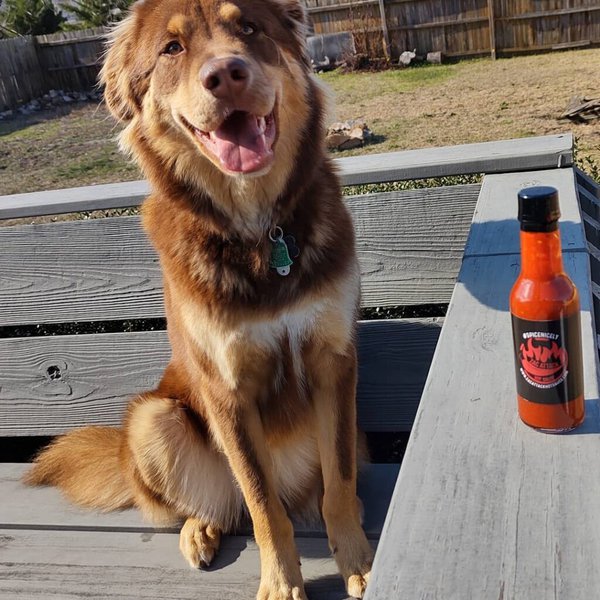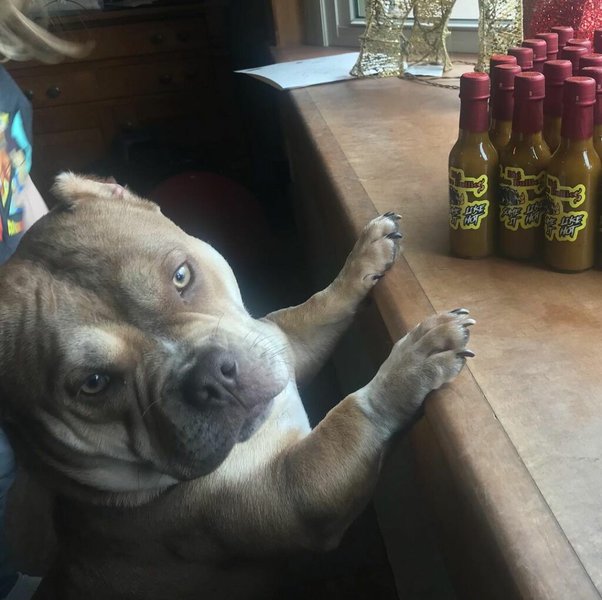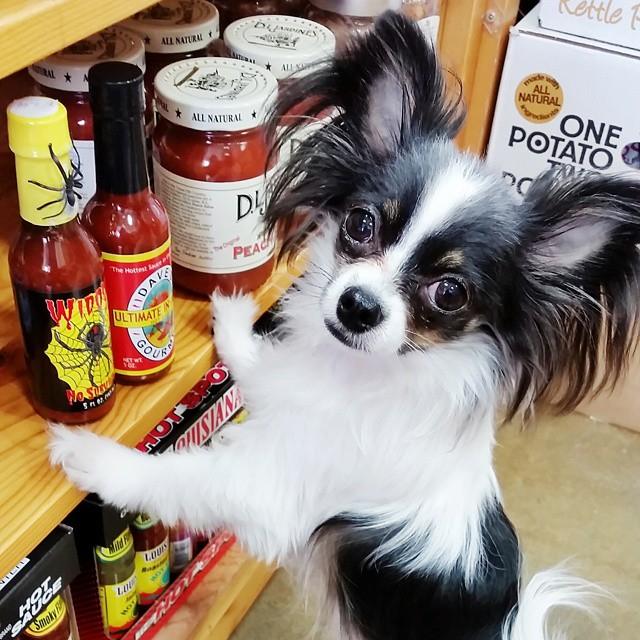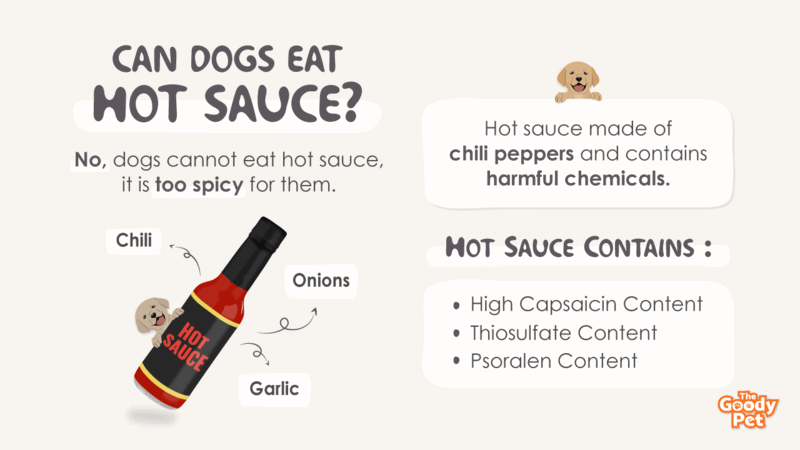It’s a great thing to bond with your furry friend so well that you’d want to share your food with it. However, foods with condiments like hot sauce could be a concern if you don’t know their effects on your pooch. So, before you spice up your dog’s meal with hot sauce, you should consider whether it’s okay.
Dogs cannot eat hot sauce because it is too spicy for them and can cause ulcers and digestion issues. Furthermore, some ingredients in the hot sauce are toxic to dogs, and if the sauce enters your pooch’s eyes, it may cause some level of pain and discomfort.
That said, would you like to know more about hot sauce’s effects on your furry friend? Please keep reading as we’ll be exploring more on them in this article.
Can Dogs Eat Hot Sauce?

Dogs can’t eat hot sauce because it’s made of chili peppers and contains harmful chemicals. The hot sauce could also cause your furry companion to suffer from ulcers, heartburn, and indigestion.
Hence, dogs may find hot sauce uncomfortable to consume because it’s too spicy for them. The hot sauce can cause dogs to have diarrhea, leading to dehydration.
Why Can’t Dogs Eat Hot Sauce?
There are several reasons why dogs can’t eat hot sauce.
Firstly, chili, hot sauce’s main component, contains capsaicin which causes ulcers and stomach upsets in dogs. Furthermore, onions and garlic are key ingredients in hot sauce, both of which contain thiosulfate, which is, when consumed, dangerous to dogs.
In addition, hot sauce causes discomfort in dogs. They find it too spicy, and eating it isn’t a pleasant experience for them. If it splashes into their eyes, it’s even worse.
Are you curious to find out more about why your dog can’t eat hot sauce? Then, join me as I explain below.
High Capsaicin Content
One of the major reasons you can’t give your pooch hot sauce is because it contains capsaicin which is unpleasant to consume. I’m sure you’ve felt the burning sensation after eating food spiced up with hot sauce. Well, that’s caused by capsaicin.
Dogs can feel the same sensation, and when they do, it’s worse. Because they can’t exclaim “hot!” and grab a glass of milk on their own, they’ll feel uncomfortable and distressed.
You certainly wouldn’t want your dog to feel this way, so it’s best you don’t give it any hot sauce.
Thiosulfate Content
Most hot sauces contain garlic and onion, both of which add flavors we all enjoy. However, while your dog may savor its flavor, it can cause some issues.
Garlic and onions contain thiosulfate, which is toxic to dogs. Thiosulfate can destroy red blood cells in dogs and cause anemia.
Scary, right? What’s worse is that anemia is hard to treat in dogs. Health complications can arise from treatment in some cases. With hot sauce potentially causing anemia, it’s best to avoid giving your dog any.
Psoralen Content
A lot of hot sauces come with a dash of lemon these days. Unfortunately, while lemon isn’t particularly bad in humans, the psoralen it contains is harmful to dogs.
Most dogs tend to have allergic reactions to the chemical, and in rare cases, some even die from psoralen’s effects.
What Health Effects Will My Dog Suffer From After Eating Hot Sauce?

If your dog ate hot sauce or any food containing it, it might suffer from heartburn, indigestion, and several allergic reactions.
Heartburn
It’s common for humans to feel heartburn after eating spicy food. So, you shouldn’t be surprised to know that it happens in dogs too. However, dogs don’t usually have heartburn because their normal diets don’t contain the spices that cause it.
However, foods like hot sauce can trigger this malady. Capsaicin in hot sauce is the usual culprit of heartburn in dogs. It may be a relatively new experience for your dog and will cause it a lot of pain.
Ulcers
After prolonged consumption, hot sauce can cause ulcers in your pooch’s stomach and intestines. Ulcers are pretty terrible in dogs and can make eating an unpleasant activity. In addition, this could lead to anorexia and weight loss in your canine buddy.
Gastrointestinal Upsets
Your dogs could have an upset tummy after eating hot sauce. Because its guts aren’t designed to have spicy food, it will have issues taking it in.
Do you remember the first time you had Mexican food? Yep, your dog will have the same or possibly a worse tummy issue after eating hot sauce too.
These upsets can range from mild to extremely painful. But, of course, your dog would be extremely uncomfortable in this state and may even whine in pain.
Diarrhea
Your dog may have diarrhea after consuming hot sauce. It’s not the smooth, liquid consistency of hot sauce that causes diarrhea in dogs. It’s rather some of the toxins in it that incite it.
Thiosulfate in garlic is one of the chemicals your dog’s body can quickly respond to when it eats it. As a result, your pooch will feel the urge to poop a few hours after eating the meal. Sadly, its poop will be watery and, in the end, might cause dehydration.
Furthermore, the psoralen and capsaicin in the hot sauce can cause diarrhea, but not as much as thiosulfate does.
Tremors
Tremors are a common allergic reaction in dogs. When your dog’s immune system begins to react to the introduction of some toxins such as capsaicin, thiosulfate, and psoralen, your dog will have tremors.
These rhythmic, involuntary spasms can be draining to your dog. In the end, it could leave your dog without energy. Sometimes, tremors can be fatal.
Anemia
Anemia could be caused by the garlic and onions in hot sauce. Both these vegetables contain thiosulfate, which is toxic in dogs.
Thiosulfate breaks down red blood cells in your pooch’s body and eventually causes anemia. This process doesn’t occur in humans, as other factors cause our anemia. Nonetheless, the thiosulfate content of hot sauce can cause fatally dangerous anemia in canines.
Breathing issues
Your dog could start displaying symptoms of a respiratory disorder after eating hot sauce. An allergen or toxin contained in the sauce, like capsaicin, could initiate negative reactions in your pooch. In most cases, shortness of breath is usually mild, and after a brief session of frantic panting, dogs get over it.
However, in rare cases, shortness of breath from eating hot sauce could mean a deeper issue in your dog’s respiratory system. This issue could be triggered by the hot sauce and lead to death.
So, given the severity of the negative effects of hot sauce on your dog, it’s best to avoid giving your canine buddy any of it.
What Should I Do If My Dog Ate Hot Sauce?
If your dog ate some hot sauce, it’s best to provide enough water for it to drink. Also, to cancel the effects of capsaicin from the hot sauce on your pooch, you should give it some milk to drink.
Milk is usually the first thing that comes to mind when you’re suffering from the effects of excessive spice. And it’s the same with dogs.
Properly diluted milk with the right concentration will cool down your dog’s tongue and restore fluids it may have lost after sweating or suffering from a case of diarrhea.
Also, oral rehydration therapy is very important in keeping your pooch safe from the effects of dehydration, especially after a bad spell of diarrhea. So, it’s best to get some over-the-counter ORT solute for your dog from the veterinary pharmacy.
If your dog starts demonstrating symptoms of poisoning from the toxic components of hot sauce, you should call your vet to check on it. A qualified vet will be able to provide the required healthcare your canine buddy needs to transition to full health once more.

What Should I Do If My Dog Likes Hot Sauce?
If your dog likes hot sauce, it’s best to desist from giving it any as it can be harmful to its health. Furthermore, you should provide less harmful alternatives to a hot sauce that provide a similar spicy sensation in dogs. Basil, peppermint, and fennel are usually the best options.
As I’ve established, hot sauce is not a good option for your dog because of the many health risks it poses. So, you might face an issue if your dog actually likes the taste of the hot sauce and comes back for more despite its spiciness.
If you are in such a situation, here are some tips that will help you stop your dog from having any hot sauce.

Gradually Reduce Hot Sauce Portions
If your dog is crazy about hot sauce, then one of the best ways to stop it from eating it is by gradually reducing the amount of hot sauce it eats.
Ensure that you expose it to hot sauce only a few times a week and give it just a little bit to satiate its desires. The less hot sauce you give it, the less dependent it will be on the sauce.
Provide Healthier Substitutes
There are generally healthier substitutes to a hot sauce that provide a similar spicy sensation in dogs, such as peppermint and basil.
Since dogs don’t have the same amount of taste buds on them, they will barely notice the difference. Although they might have issues accepting them because they might be differently shaped and have contrasting consistencies.
Furthermore, basil and peppermint provide health benefits to your pooch. They detoxify its system and even help to relieve diarrhea.
Associate Eating Hot Sauce With A Punishment
Telling dogs “no” and “bad dog” when they do something wrong demotivates them from repeating those actions.
In the same vein, making your dog feel bad for eating hot sauce will make it not want to have any eventually. You can do this by telling it “no” when it eats some sauce and giving it treats for not eating the sauce.





